Unit 7 I've got to go and see! 课件
文档属性
| 名称 | Unit 7 I've got to go and see! 课件 |
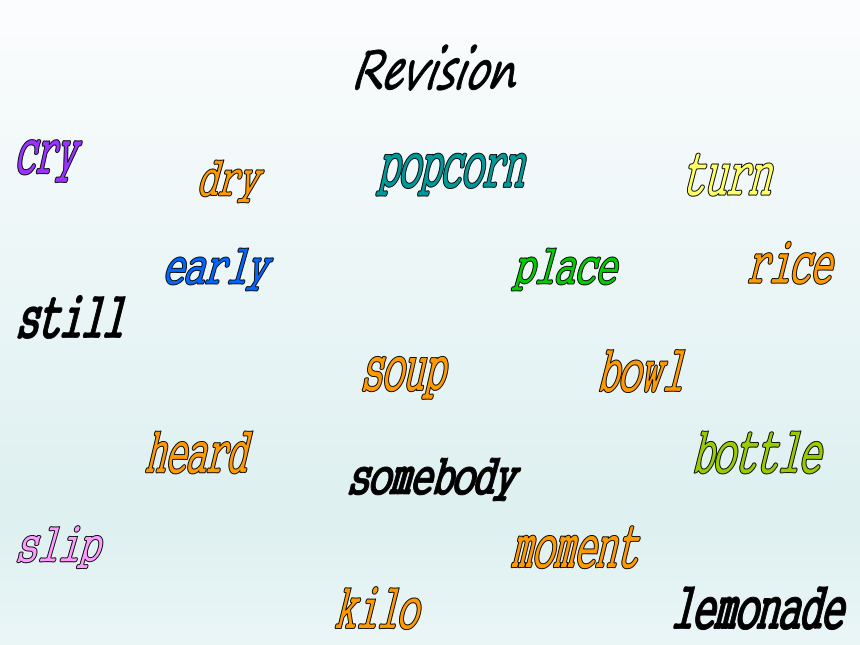
|
|
| 格式 | zip | ||
| 文件大小 | 551.4KB | ||
| 资源类型 | 教案 | ||
| 版本资源 | 剑桥版 | ||
| 科目 | 英语 | ||
| 更新时间 | 2017-06-14 15:29:04 | ||
图片预览

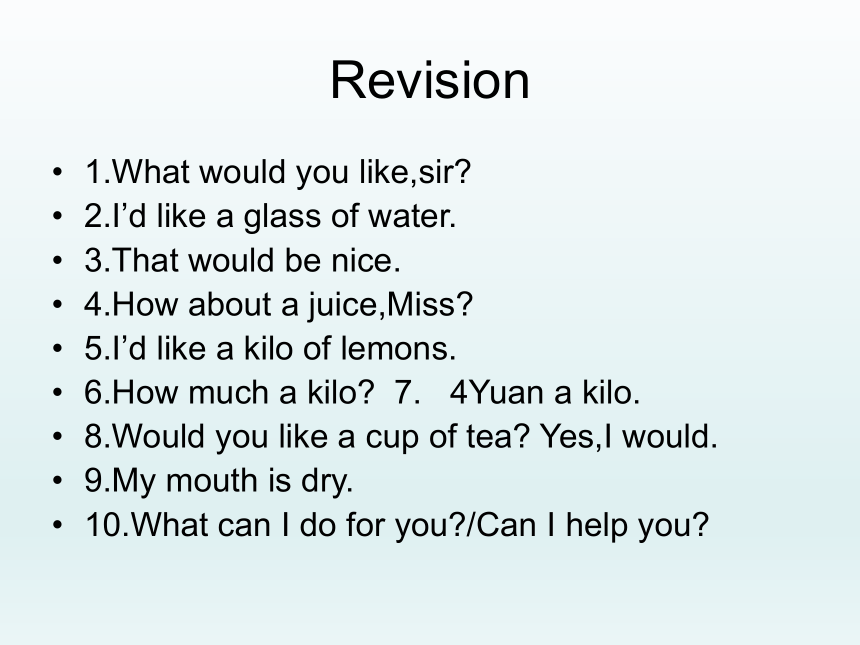
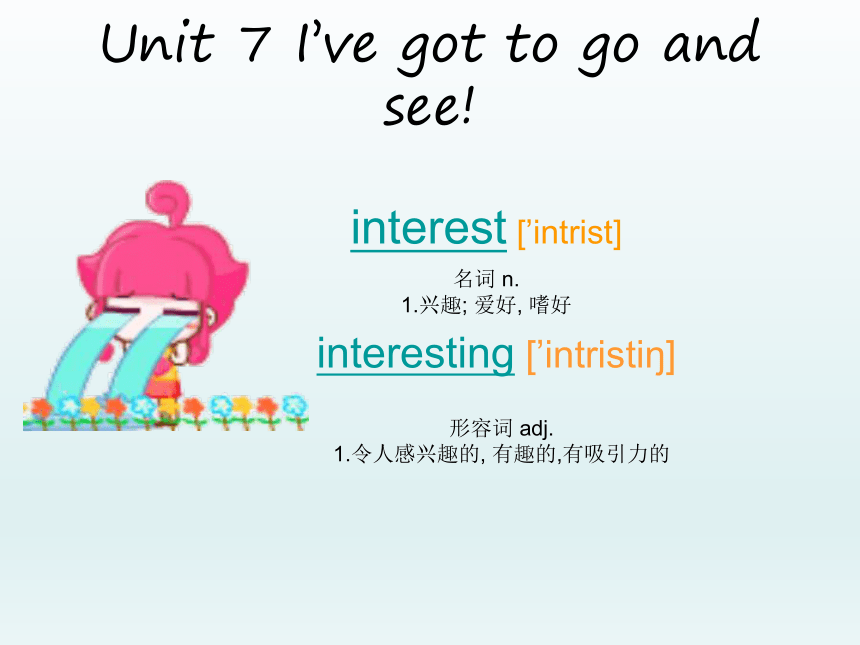
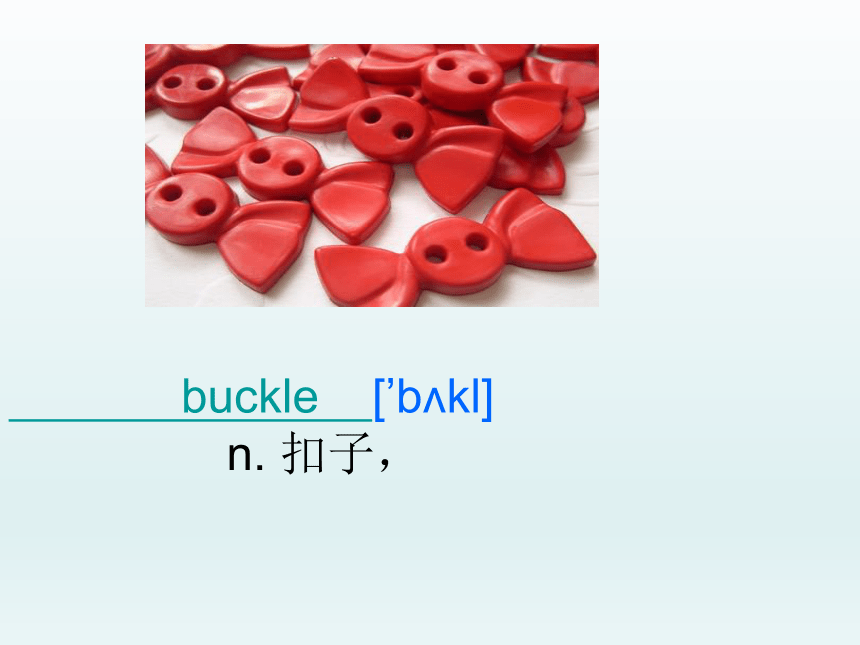
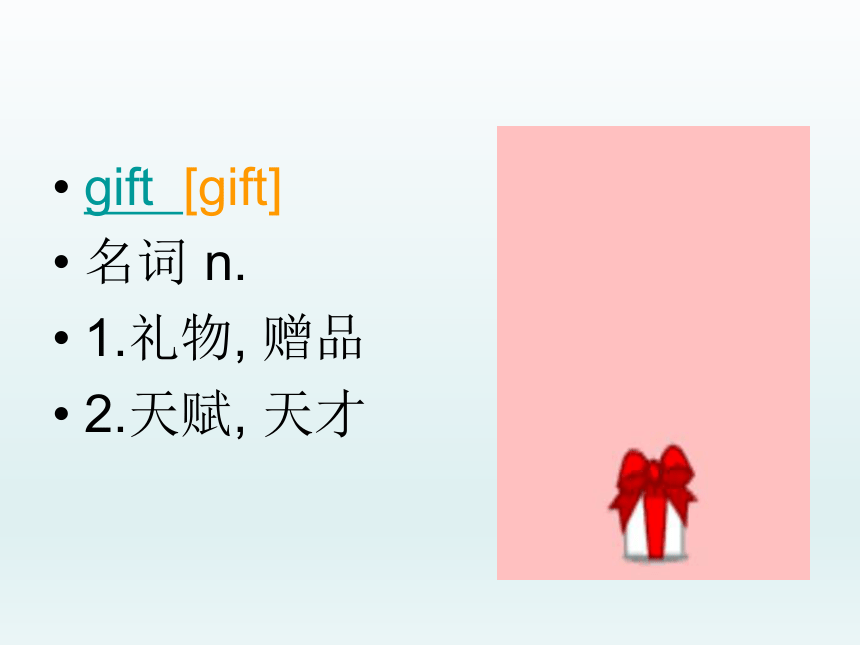
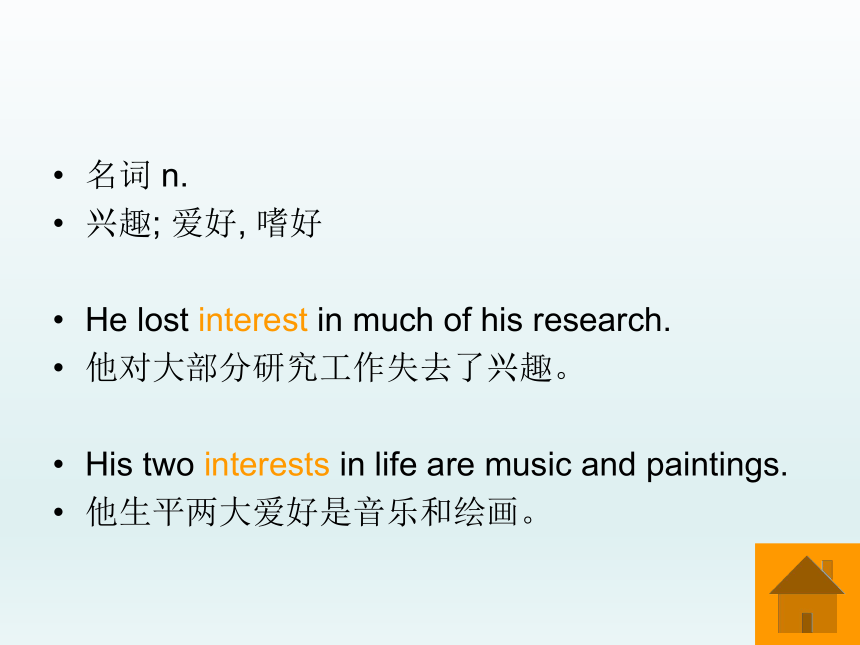
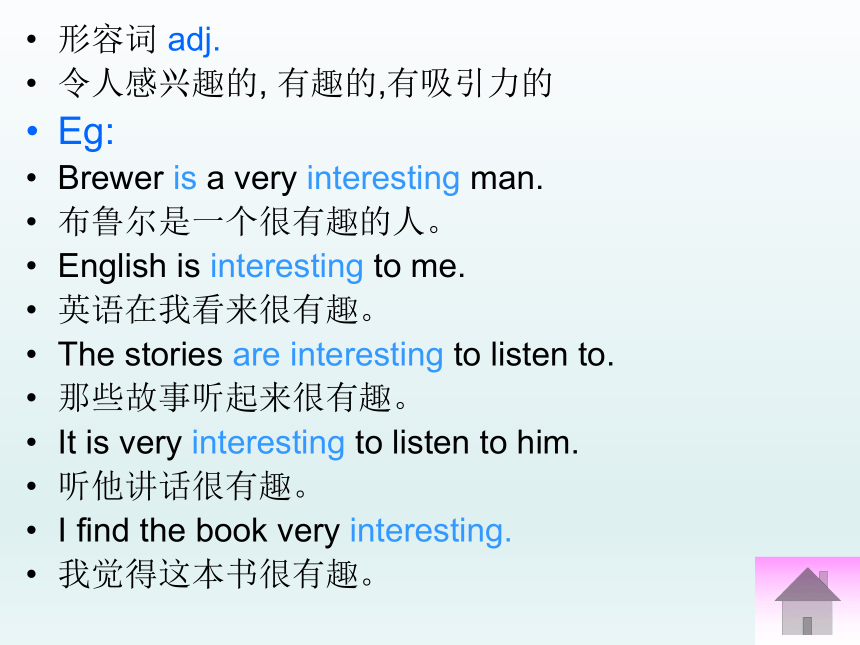
文档简介
课件19张PPT。lemonadepopcornmomentsomebodyplaceslipbottlericekiloearlyturnheardbowlsoupdrycrystillRevisionRevision1.What would you like,sir?
2.I’d like a glass of water.
3.That would be nice.
4.How about a juice,Miss?
5.I’d like a kilo of lemons.
6.How much a kilo? 7. 4Yuan a kilo.
8.Would you like a cup of tea? Yes,I would.
9.My mouth is dry.
10.What can I do for you?/Can I help you?Unit 7 I’ve got to go and see! interest [’intrist]
名词 n.
1.兴趣; 爱好, 嗜好
interesting [’intristi?] 形容词 adj.
1.令人感兴趣的, 有趣的,有吸引力的
buckle [’b?kl] n. 扣子,
gift [ɡift]
名词 n.
1.礼物, 赠品
2.天赋, 天才
名词 n.
兴趣; 爱好, 嗜好
He lost interest in much of his research.
他对大部分研究工作失去了兴趣。
His two interests in life are music and paintings.
他生平两大爱好是音乐和绘画。
形容词 adj.
令人感兴趣的, 有趣的,有吸引力的
Eg:
Brewer is a very interesting man.
布鲁尔是一个很有趣的人。
English is interesting to me.
英语在我看来很有趣。
The stories are interesting to listen to.
那些故事听起来很有趣。
It is very interesting to listen to him.
听他讲话很有趣。
I find the book very interesting.
我觉得这本书很有趣。名词 n.
1.扣子,搭扣, 扣环
及物动词 vt. & 不及物动词 vi.
1.用搭扣扣紧
The two ends buckle at the back.
带子两端在背后扣起来。
名词 n.
1.礼物, 赠品
I neglected to bring a gift.
我忘了带一件礼物来。
The Christmas tree was decked with gifts.
圣诞树上挂满了各种礼品。
2.天赋, 天才
He has the gift to draw painting.
他有绘画的天分。
Quick answerSentences
Why are the children so happy?
They are putting on a short play.
她们正在表演一个短剧。
put on上演, 演出; What are these people doing?
They are having an interesting class.那些人正在做什么?她们正在上一节有趣的课。I must go and see it now?
Who is giving them the class?
Miss Sun我必须去看看它。谁在给他们上课?1.现在进行时态:
现在进行时态表示现在正在进行着某种事情。
2.构成形式:
助动词“be+动词-ing”。动词-ing是动词的分词形式,动词be要根据主语人称进行
变化 。
Grammar3. 现在分词变化形式
a.直接在词尾加ing. 如:working,saying,watching
b.重读闭音节双写最后一个字母加ing.
如:shopping ,running,getting
c.结尾是不发音的e,去e加ing. 如:take--taking,have--having,leave--leaving动词分词练习题:
1.sing 2.dance
3.listen 4.write
5.speak 6.jump
7.hop 8.swim
1.singing 2.dancing
3.listening 4.writing
5.speaking 6.jumping
7.hopping 8.swimming Remark1.Why are the children so happy?
2.They are putting on the short play.
3.I must go and see it now.
4.What are these people doing?
5.They are having an interesting class.
6.Who is giving them the class?
2.I’d like a glass of water.
3.That would be nice.
4.How about a juice,Miss?
5.I’d like a kilo of lemons.
6.How much a kilo? 7. 4Yuan a kilo.
8.Would you like a cup of tea? Yes,I would.
9.My mouth is dry.
10.What can I do for you?/Can I help you?Unit 7 I’ve got to go and see! interest [’intrist]
名词 n.
1.兴趣; 爱好, 嗜好
interesting [’intristi?] 形容词 adj.
1.令人感兴趣的, 有趣的,有吸引力的
buckle [’b?kl] n. 扣子,
gift [ɡift]
名词 n.
1.礼物, 赠品
2.天赋, 天才
名词 n.
兴趣; 爱好, 嗜好
He lost interest in much of his research.
他对大部分研究工作失去了兴趣。
His two interests in life are music and paintings.
他生平两大爱好是音乐和绘画。
形容词 adj.
令人感兴趣的, 有趣的,有吸引力的
Eg:
Brewer is a very interesting man.
布鲁尔是一个很有趣的人。
English is interesting to me.
英语在我看来很有趣。
The stories are interesting to listen to.
那些故事听起来很有趣。
It is very interesting to listen to him.
听他讲话很有趣。
I find the book very interesting.
我觉得这本书很有趣。名词 n.
1.扣子,搭扣, 扣环
及物动词 vt. & 不及物动词 vi.
1.用搭扣扣紧
The two ends buckle at the back.
带子两端在背后扣起来。
名词 n.
1.礼物, 赠品
I neglected to bring a gift.
我忘了带一件礼物来。
The Christmas tree was decked with gifts.
圣诞树上挂满了各种礼品。
2.天赋, 天才
He has the gift to draw painting.
他有绘画的天分。
Quick answerSentences
Why are the children so happy?
They are putting on a short play.
她们正在表演一个短剧。
put on上演, 演出; What are these people doing?
They are having an interesting class.那些人正在做什么?她们正在上一节有趣的课。I must go and see it now?
Who is giving them the class?
Miss Sun我必须去看看它。谁在给他们上课?1.现在进行时态:
现在进行时态表示现在正在进行着某种事情。
2.构成形式:
助动词“be+动词-ing”。动词-ing是动词的分词形式,动词be要根据主语人称进行
变化 。
Grammar3. 现在分词变化形式
a.直接在词尾加ing. 如:working,saying,watching
b.重读闭音节双写最后一个字母加ing.
如:shopping ,running,getting
c.结尾是不发音的e,去e加ing. 如:take--taking,have--having,leave--leaving动词分词练习题:
1.sing 2.dance
3.listen 4.write
5.speak 6.jump
7.hop 8.swim
1.singing 2.dancing
3.listening 4.writing
5.speaking 6.jumping
7.hopping 8.swimming Remark1.Why are the children so happy?
2.They are putting on the short play.
3.I must go and see it now.
4.What are these people doing?
5.They are having an interesting class.
6.Who is giving them the class?
同课章节目录
- Unit 1 Going to different places!
- Unit 2 What's the weather like today?
- Unit 3 Let's play doctors.
- Unit 4 I can see with my eyes.
- Unit 5 Simon Paul lives in the country.
- Unit 6 I'd like a glass of water.
- Unit 7 I've got to go and see!
- Unit 8 Who is the first?
- Unit 9 I like sunny days but Idon't like rainy day
- Unit 10 Let's guess.
- Unit 11 What's your hobby?
- Unit 12 Animals are our good friends.
- Unit 13 Ican spot the frog,can you?
- Unit 14 There isn't any bread in the kitchent.
- Unit 15 Let's tind it quickly!
- Unit 16 He can do better than his brother!
